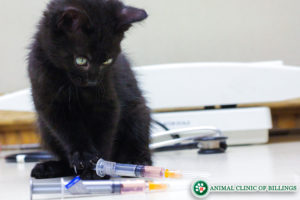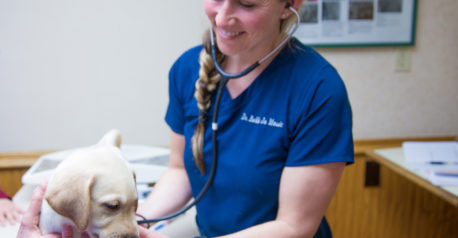Cat Preventive Health Care
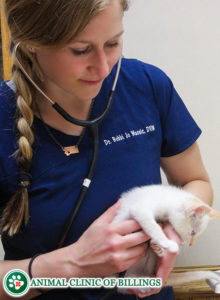
What is a Cat Preventive Care Program?
At the Animal Clinic of Billings, we know prevention is the best medicine for the health and wellness of your cat. We offer our feline patients and their owners a comprehensive preventive care program designed to promote cat health, wellness, and longevity.
A cat preventive care program at the Animal Clinic of Billings includes:
- Annual or Semi-Annual Physical Examinations
- Ongoing Health and Wellness Education
- Blood and Urine Analysis
- Periodic At-Home Monitoring
A preventive cat care program ensures your feline friend is receiving everything needed to live a long and healthy life through early detection of any illness or disease that may be developing, and maintaining good hygiene, proper nutrition, and adequate environmental and social stimulation.
Ongoing Health and Wellness Education
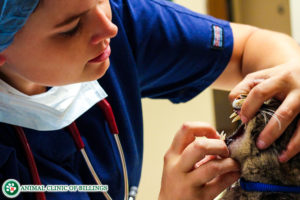
In the fight against many cat diseases, early detection makes a difference in the effectiveness of any medical treatment. Most feline diseases are easier to treat in the early stages; however; some diseases reach a tipping point where treatment is no longer an option.
Cats are masters at hiding signs and symptoms of disease. Often, by the time people discover symptoms of illness, it is too late. For this reason, regular exams with your veterinarian are essential.
Semi-Annual Cat Wellness Examinations
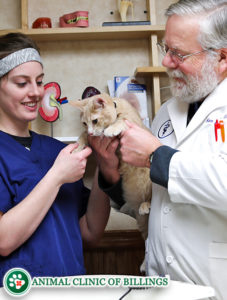
Your veterinarian should perform a semi-annual wellness exam every six months. The examination is an extensive overview of your cat’s health.
Your veterinarian will go over various aspects of your cat’s condition, including:
- Dental Health
- Vaccination Status
- Parasite Control, including internal and external parasites
- Exercise and Environmental Enrichment
- Nutrition
- Internal Organs
- Ears and Eyes
- Coat and Skin
- Behavior
- Bloodwork to check metabolic functions
- Urine and Fecal Testing if needed
Based on the findings, your veterinarian will address any concerns, suggest recommendations, and work with you to keep your cat healthy.
Bathing, Grooming, & Hygiene Regimen For Cats
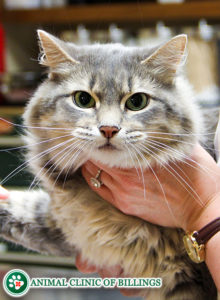 A considerable part of a cat’s health is self-bathing and grooming. A cat manages its skin, fur, and digestive health through self-grooming. As a cat owner, take steps to ensure the most advantageous hygiene is achieved for your cat by following an easy preventive care routine.
A considerable part of a cat’s health is self-bathing and grooming. A cat manages its skin, fur, and digestive health through self-grooming. As a cat owner, take steps to ensure the most advantageous hygiene is achieved for your cat by following an easy preventive care routine.
This includes:
- Trimming your cat’s claws
- Brushing your cat’s hair regularly to reduce knots and furballs
- Physical interactions, including playing and petting to maintain a healthy comfort level with interaction that engages the cat’s senses.
The temperament and disposition of your cat may affect your ability to maintain this routine.
If you are unable to do so, our veterinary staff at the Animal Clinic of Billings is happy to discuss options and behavioral modification techniques with you during your next appointment.
Feline Cancer
Cancer is the most frightening and painful diagnosis a cat owner can receive. With early detection, we have a good chance of defeating even cancer in our feline friends.
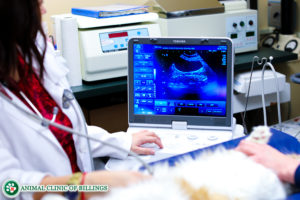
If you see lumps or conditions that look worrisome on your cat, please schedule an appointment with one of our veterinarians immediately. It is imperative to understand that most of the cancer symptoms that typically go unnoticed by cat owners can be caught in the early stages by a veterinarian.
Because most signs of illness in cats are hidden until they are in a more serious condition, it is vital that a veterinarian conduct a thorough physical on your cat regularly.
Following the exam, our veterinarians will review signs to look for when a cat may be seriously ill.
Integrative Medicine For Cats
Preventive care for cats includes various fields of integrative medicine, which consists of alternative practices that enhance treatment-based and standard preventive protocols.
Examples of integrative medicine that promote cat health include:
- Laser Therapy
- Acupuncture
Integrative medicine is effective in promoting cat health when used in conjunction with other veterinarian-recommended treatments. Ask your veterinarian about integrative medicine options that could help keep your cat healthy for many years to come.
Cat Dentistry
Feline dentistry is one of the most neglected aspects of preventive veterinary care for cats. Once again, because our feline friends do not let on when they are suffering from oral pain, most cat owners don’t realize their cat is suffering from excruciating pain when dental disease is present. Most cats have developed dental disease or gingivitis that requires veterinary care by four years of age. A thorough dental examination requires anesthesia and dental x-rays.
Dental disease in cats typically lies underneath the gum line and requires dental x-rays to identify the presence of disease within the tooth and how much of the cat’s tooth and the tooth’s root have been affected – which could be a source of ongoing pain for the cat. The causes of dental diseases in cats include:
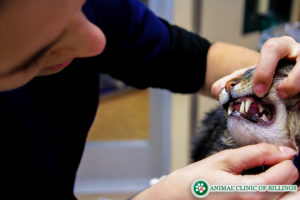
- Gum Disease
- Mouth Sores and Ulcers
- Tooth Loss
- Periodontal Disease
- Gingivitis
Your cat should have a thorough teeth cleaning by your veterinarian every 6-12 months. In the meantime, regular cleaning can be performed at home. The Animal Clinic of Billings veterinarians and dental technicians would love to teach you how to brush your cat’s teeth. Many cats will tolerate daily teeth cleaning if it’s done gently and respectfully.
You can also facilitate optimum dental health for your cat by providing toys and treats designed to help strengthen an clean your feline friend’s gums and teeth. Ask your veterinarian at your next appointment for their recommendations of dental toys and treats to best meet your cats individualized dental needs.
For more information on feline dentistry, visit our dental care page.
Flea & Tick Prevention For Cats
No insects are as vexing to your cat as ticks and fleas. Fleas cause severe skin irritation to cats and can infest your home if you are not maintaining a proper preventive flea and tick plan. Ticks transmit dangerous and sometimes fatal diseases. These parasites thrive in almost every part of the country, and outdoor, as well as, indoor cats are both at risk for acquiring fleas and ticks.
Flea and tick prevention is a critical element of our comprehensive preventive care program for cats here at the Animal Clinic of Billings. There are many products available that our veterinarians encourage cat owners to avoid. Every year, our veterinarians at the Animal Clinic of Billings review each new and available flea and tick product to ensure our recommendations and knowledge of preventive flea and tick products are as up to date and accurate as possible.
The recommendations of flea and tick medications made by our veterinarians are based entirely on safety, effectiveness, and cost to our clients. With these factors in mind, we work with you to customize the best parasite prevention plan to meet the individualized needs of your pets, yourself, and your family.
For more information on flea and tick prevention for cats, visit our cat flea and tick page.
 Cat Nutrition
Cat Nutrition
Raising a healthy cat is dependent on the type and amount of food they consume daily. Low-quality cat foods and treats that are high in fat or carbohydrates negatively affect your feline friend’s health.
The most common health problem our veterinarians encounter in our feline patients is cat obesity. The best way to avoid feline obesity is to have your cat follow a veterinarian recommended nutritional plan from the very beginning at an early age. This includes the proper diet selection, feeding program, and exercise plan for your cat.
Cats have vastly different nutritional requirements during each stage of their lives, which cat be split into three categories, including:
- Kittens
- Adult Cats
- Senior Cats
Health conditions which require special diets for cats
Your veterinarian will determine whether your cat has a healthy diet. If your cat needs dietary changes, your veterinarian will formulate a custom cat food selection and feeding plan tailored to your cat’s nutritional needs, lifestyle, and current physical condition. The plan will likely include prescribed feeding frequency and serving size.
The Animal Clinic of Billings veterinarians recommend high quality canned food as the primary source of your cat’s nutrition; however; a small amount of kibble in the diet is okay for your cat as well.
Most cats overeat if allowed to free feed and your feline friend will not tell you if they are full, or what nutritional changes they need. Therefore, you need to take control of their dietary program to ensure your cat remains healthy and well-nourished throughout every stage of his or her life.
For more information on cat nutrition and the best cat foods visit our cat nutrition and best cat food page.
Cat Vaccinations
Vaccinations are among the most essential components of cat care and preventive health. The vaccination protocol needed for cats starts with a series of immunizations, or vaccinations, that are given to your cat as a kitten. After that, a cat will need booster immunizations periodically throughout the cats lifetime. Cat vaccinations prevent and fight many serious and potentially fatal diseases cats may contract. Vaccines also prevent cats from spreading contagious and dangerous or deadly diseases to other felines or humans even.
Rabies Vaccination
Rabies is the most important and mandated core vaccine a cat needs. Shots are required by law for all pets, cats, and dogs alike, and we urge you to provide a healthy lifestyle ensuring your feline friend completes his or her recommended vaccination protocol on time.
The first dose of the rabies vaccination a cat receives is good for one year, regardless of age (they must be at least 12 weeks old). A year later, the cat will need another rabies booster shot. Following the one-year rabies booster shot, the rabies vaccine is then given once every three years.
Rabies is an acute virus that attacks a cat’s nervous system. It spreads through contact with saliva or other body fluids, but most often, through a bite of an infected animal. Bats, raccoons, skunks, foxes, and other wildlife are all carriers of rabies. The disease is 100% fatal to animals and humans once symptoms develop.
FVRCP Vaccine – feline viral rhinotracheitis, calicivirus and panleukopenia
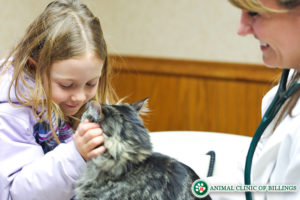
The FVRCP vaccine is a core vaccine, and veterinarians recommend it for all cats. The FVRCP shot is given to cats as an initial vaccination series of three scheduled doses one month apart. Because maternal antibodies in a kitten’s bloodstream keep a vaccine from working until the kitten has reached 6-8 weeks of age, the FVRCP vaccination schedule begins at eight weeks old for kittens.
Cats older than six months of age with an unknown vaccine status need two doses one month apart. The FVRCP vaccine is then given as a booster shot one year later, and once every three years after that.
Diseases cat vaccines protect against:
Rhinotracheitis
Rhinotracheitis is a feline herpes virus that targets the upper respiratory tract, eyes, and throat of a cat, causing ocular and nasal discharge and swelling, inappetence, and lethargy.
This can be fatal to cats, especially to kittens. Cats who are carriers of the rhinotracheitis disease shed the virus through respiratory secretions during occasional flare-ups.
The rhinotracheitis vaccine doesn’t prevent infection in all cases, but it does reduce the duration and severity of flare-ups the infected cat experiences and helps the immune system keep the virus in an inactive state.
Calicivirus
Calicivirus is a virus that targets the mouth and the upper respiratory tract in cats, often causing oral ulcers. Symptoms of calicivirus in cats include inappetence, nasal discharge, fever, and possibly pneumonia. Calicivirus in cats transmits through respiratory fluids.
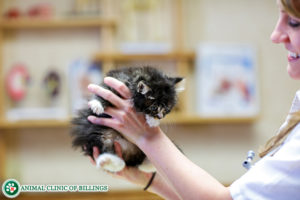
Panleukopenia
Panleukopenia is a virus that targets a cats GI or gastrointestinal tract and immune system. This is related to canine parvo and feline distemper or also known as feline parvo. Symptoms of panleukopenia in cats can include vomiting, diarrhea, fever, and lethargy. The panleukopenia disease can become fatal rapidly for an infected cat, but especially to kittens if contracted. Panleukopenia transmits to cats and kittens through feces and other contaminated objects and environments.
FeLV (Feline Leukemia Virus)
FeLV or Feline Leukemia Virus is a non-core vaccine. We recommend it for cats that go outside, live with other cats who go outside or share a living space with an infected cat. The FeLV vaccine is administered in an initial series of two doses one month apart, then a booster every two years. The FeLV virus interferes with a cats immune system function and dramatically increases a cat’s risk of developing lymphoma. FeLV is transmitted to cats through contact with contaminated saliva, often from cats grooming each other.
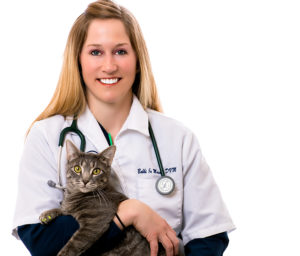
At the Animal Clinic of Billings, our veterinarians and veterinary technicians provide the best comprehensive and compassionate preventive cat care services available, and we love to help you learn how to give your cat the best care in every way.
Contact us on our website or call 406-252-9499 to get started on a preventive cat care routine for your furry feline friend and to schedule an appointment with the best cat veterinarians in Billings today!
406-252-9499 REQUEST AN APPOINTMENT


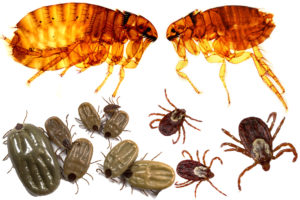
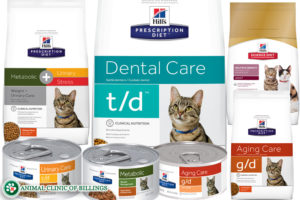 Cat Nutrition
Cat Nutrition